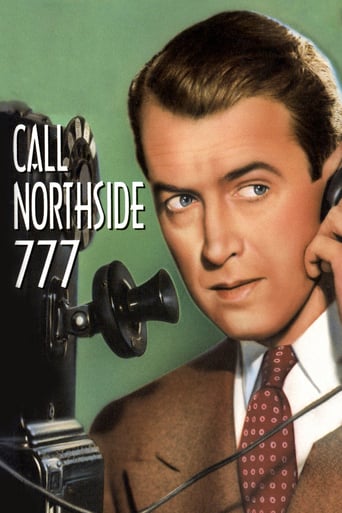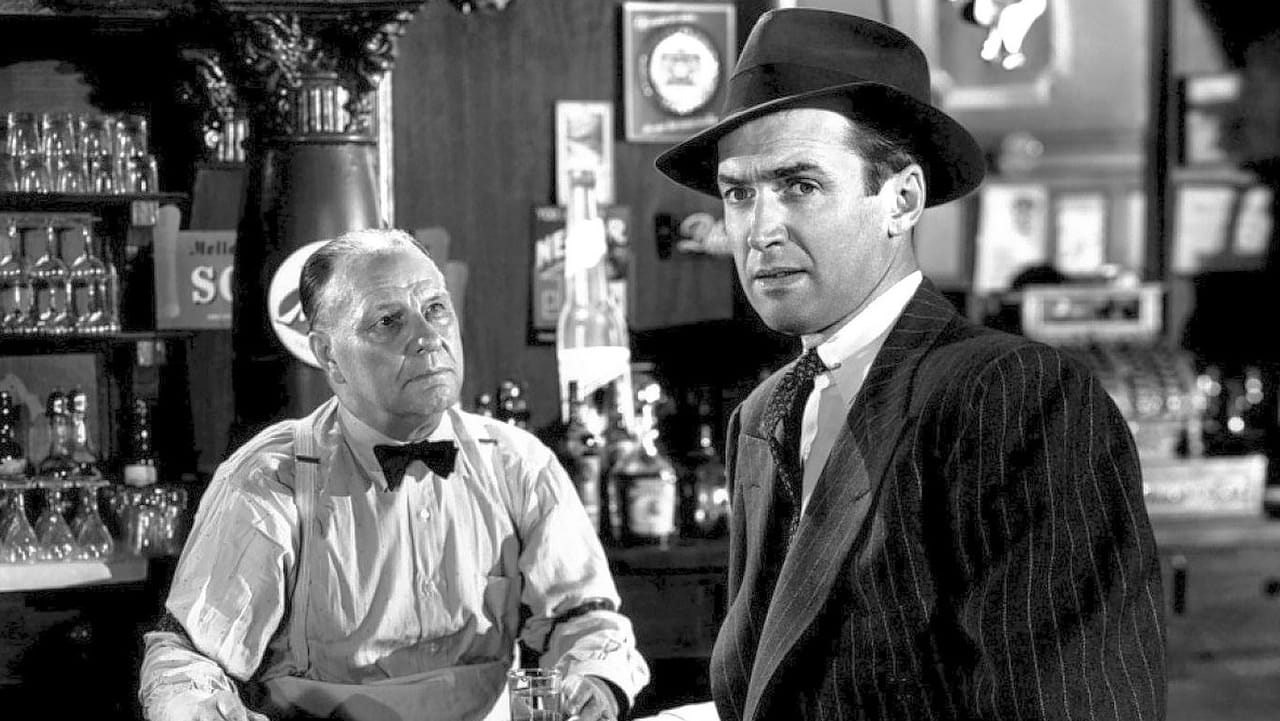utgard14
No nonsense crime docudrama, based on a true story, about a reporter (James Stewart) working to find evidence to free a man wrongly convicted of killing a police officer eleven years before. Not quite a film noir as I would describe it but it nonetheless is stuck with that label. It's really good no matter what genre it belongs in. Jimmy Stewart is excellent as the initially cynical reporter who comes around to believing an injustice has been done. You simply can't go wrong with Stewart in any movie, at least as far as I've seen. Sympathetic turn from Richard Conte as the innocent convict. Lee J. Cobb is great, as always. Polygraph expert Leonard Keeler appears as himself. Normal people trying to be actors in old movies always amuses me for some reason. It's a gripping movie, well directed by Henry Hathaway, that moves along at a relatively slow pace but keeps you invested. One note is that the case this is based on was actually about two guys wrongfully convicted. This movie focuses mainly on one of them and only features the other in a brief scene. I assume this was because the other guy wasn't exonerated until two years after this movie was released.
ironhorse_iv
This is a wonderful drama about the importance of investigative journalism. In this day of easy to come, digital news, this movie makes us stand back and realize how hard, it was for print media to get their stories. I highly recommended, modern viewers in checking this wily film noir. Directed by Henry Hathaway, the film tells the story of a Chicago reporter, P.J. McNeal (James Stewart) who trying to prove the innocence of a man, Frank Wiecek (Richard Conte) who was wrongly convicted for murder, many years before, of a Chicago Traffic Cop. Without spoiling the movie, too much, while the movie states out on screen, that this is a true story. In actually, it was based on a true story. A very loose one, indeed. Since, 20th Century Fox bought the rights to this story for a film version, they titled 'Call Northside 777', which was supposedly the phone number that the innocent man's mother used in her newspaper ad. However, the actual phone number in the ad had been the far-less memorable GRO-1758. Some other elements, besides locations numbers were also changed. One big example is character's names. They were also fictionalized out of necessity, such as some central figures to the story were still living at the time of production, and had not given permission for their names to be used like the real life victims Joseph Majczek and Theodore Marcinkiewicz. Instead, they became Frank Wiecek & Tomek Zaleska (George Tyre). Some characters were even morph, together, such in the case of real-life reporters, James McGuire and Jack McPhaul who became P.J McNeal in this version. Other characters were cut out, like the judge, Charles P. Molthrop that believed a miscarriage of justice had occurred and promised the victim a new trial. Even witness, James Zagata who saw Molthrop's admission was omitted. Nor does the movie mention GOP assemblyman Ragnar "Rags" Nelson, who help in Majczek's release. Nor does the movie ever show, the Bailiff, who supposedly talk to Stewart's character in the film. Did I miss something? The movie never show that scene. While, these examples can be a bit distracting for anybody who is a history nut, but it wasn't too jarring to me. It didn't take me, out of the movie. It's still told the suspenseful story with a vivid, realistic pictorial journalism style. However, I think, I can do without the narrative of Truman Bradley. I saw, everything that he was describing on screen. Was he really needed? This movie really need to learn, 'show, don't tell' style concept of filmmaking. His voice was also getting a bit annoying with his overpraising of the newspaper business, too. Thank goodness, they cut him, off from most of the middle of the film. It was starting to hurt the film, a bit. It's so distracting. I guess, they were trying too hard on the then-novel "documentary style" of filmmaking. Indeed, the film is shot in odd style, with introductory title cards that let the viewer know the film is based on an actual Chicago murder case and that, whenever possible, the film was shot on location in Chicago, using the same settings where the actual events took place. I think a lot of this, wasn't really needed. Did we really need a reenacting of the famous 1871 Chicago Fire in this movie's opening? Honestly, what does using footage from 1937's movie 'Old Chicago' really have to do with then-modern day Chicago and this crime? It felt a little bit, like time-wasting. Also, I know this movie was the first Hollywood feature film to be shot on location in Chicago, but does the movie really needed to remind us that it is. Despite that, the film still captures not only the spirit of the story but also the essence of Chicago's night life. A lot of people talk about this film, as if it's a film noir movie, however, in my opinion, the movie itself seems a little light to be considered "film noir." After all, the movie has a happy predictable outcome, even if the real life events, end up more tragic with Majczek ending up in Asylum for another murder and Marcinkiewicz committing suicide. Also, the whole 'photo blowing' and 'polygraph' short cut, toward the end, was a bit unbelievable and full of pseudoscience BS. In my opinion, they should had still to the original ending. While, the crime story fit the genre, there is only a few scene that seem to master, the low-key lighting and deep cinematography as well. The Chicago locations feature in the film, wasn't as dangerous, tense, foreboding atmosphere as it should had. The lighting is way too bright in most scenes, plus the films tone is more positive than gritty. It's more like 'Ripped from the Headlines', journalism driven type film than anything. Remind me, a bit of 1967's crime drama 'In Cold Blood' in the way, the reporter operations. I kinda like Stewart as the tough, hard edge and cynical, P.J O'Neal. His character had a lot of character development. It's nice to see, Stewart mature from the naïve, boyish characters of his earlier films, and give him, chances to play more mature roles in the 1950s with Alfred Hitchcock. However, the most irritating about the character is the fact, he never takes notes. That was a bit unrealistic. The supporting actors, were just as strong as Stewart, with Lee J. Cobb playing his boss, to Kasia Orzazewski as Tillie Wiecek. Nevertheless, Richard Conte's wonderful performance as Frank Wiecek is the one that really shines out. I'm surprise, none of these actors were nominated for an Academy Award for these roles. What a shame! I also love the fact that the cops in the film, are real cops and the real Leonarde Keeler is playing himself in the film. It's add to the realistic tone of the film. Overall: This movie is great. It really needs to be watch more. Highly recommended.
Hendy44
I enjoyed this movie however it seemed to have very poor acting and a moderately dry story line. The movie takes place in the new chicago. in a suburban area where there is a lot of crime. the story begins in a speakeasy. many police officers come in and out of this speakeasy and the owner knows them well however in this part of the city there has been too many cases of police officers being killed by people around this area. many conclusions were quickly found and a man spent 11 years in prison for it. in this movie the viewer will witness political corruption and and also a lot ways the press and newspaper can twist and change a story. at the end of the movie all evidence is brought forward and it shows that most statements were false throughout the movie.
Claudio Carvalho
In 1932 December, in Chicago, the Polish Wanda Skutnik (Betty Garde) runs a speakeasy during the Prohibition. When the policeman Bundy is murdered inside the illegal bar, Frank W. Wiecek (Richard Conte) and his friend Tomek Zaleska are arrested and sentenced to serve 99 years each in the Illinois State Penitentiary. Eleven years later, the Chicago Times' editor Brian Kelly (Lee J. Cobb) is curious with an advertisement offering a US$ 5,000.00 reward for information about the identity of the killers of the policeman eleven years ago. He assigns the efficient reporter P.J. McNeal (James Stewart) to interview the person responsible for the ad. McNeal discovers that Frank's mother Tillie Wiecek (Kasia Orzazewski), who is a janitor, has saved her salary for eleven years to prove the innocence of her beloved son and now is offering the reward for additional information. McNeal is skeptical and believes that Frank is a cop killer, but his matter is successful and Kelly asks him to investigate further. Soon he changes his mind and realizes that Frank is a victim of the corrupt system."Call Northside 777" is an engaging movie about injustice and redemption based on a true story. The names were changed but most of the location is real. Movies of trial are usually attractive and James Stewart is one of the best actors of the cinema history. The result is a great movie directed by the also excellent Henry Hathaway. The only remark is the awful line of McNeal in the end of the movie: "Aw, look, Frank, it's a big thing when a sovereign state admits an error. But remember this: there aren't many governments in the world that would do it." Terrible way to admit an error that has cost eleven years of a man's life and made him lose his beloved wife and son. My vote is eight.Title (Brazil): "Sublime Devoção" ("Sublime Devotion")



 AD
AD



